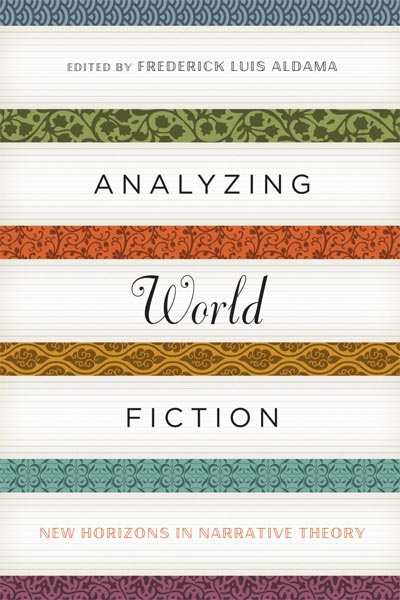 Analyzing World Fiction Analyzing World Fiction
New Horizons in Narrative Theory
Frederick Luis Aldama
Narrated by Norman Gilligan
Available from Audible
Book published by University of Texas Press
Why are many readers drawn to stories that texture ethnic experiences and identities other than their own? How do authors such as Salman Rushdie and Maxine Hong Kingston, or filmmakers in Bollywood or Mexico City produce complex fiction that satisfies audiences worldwide? In Analyzing World Fiction, fifteen renowned luminaries use tools of narratology and insights from cognitive science and neurobiology to provide answers to these questions and more.
With essays ranging from James Phelan’s "Voice, Politics, and Judgments in Their Eyes Were Watching God" and Hilary Dannenberg’s "Narrating Multiculturalism in British Media: Voice and Cultural Identity in Television" to Ellen McCracken’s exploration of paratextual strategies in Chicana literature, this expansive collection turns the tide on approaches to postcolonial and multicultural phenomena that tend to compress author and narrator, text and real life. Striving to celebrate the art of fiction, the voices in this anthology explore the "ingredients" that make for powerful, universally intriguing, deeply human story-weaving.
Systematically synthesizing the tools of narrative theory along with findings from the brain sciences to analyze multicultural and postcolonial film, literature, and television, the contributors pioneer new techniques for appreciating all facets of the wonder of storytelling.
Frederick Luis Aldama is Arts and Humanities Distinguished Professor of English at Ohio State University. He is the author and editor of nine books, including Postethnic Narrative Criticism; Brown on Brown: Chicano/a Representations of Gender, Sexuality, and Ethnicity; the MLA-award winning Dancing With Ghosts: A Critical Biography of Arturo Islas; and Why the Humanities Matters: A Common Sense Approach.
REVIEWS:
“Analyzing World Fiction is an outstanding and compelling anthology that develops a cross-cultural perspective to negotiate a wide variety of different narrative genres from all over the world. The collection sees narrative as a universal phenomenon, while simultaneously attending to the cultural specificities and historical particularities of its various manifestations. The superb analyses in this anthology pay particular attention to hybrid multicultural works and will most certainly open up new and innovative horizons for future discussions of narrative fiction in the context of our globalized world.”
—Jan Alber, University of Freiburg, Germany “The edited volume Analyzing World Fiction is a superb collection of outstanding, cutting-edge, scholarly articles on narrative theory. The essays are brilliantly conceptualized, meticulously researched by established as well as up-and-coming scholars. They provide the reader with new insights into the complexities of narrative structures in world literature today and contribute to a deeper understanding of the wide spectrum of contemporary theoretical approaches available to scholars focusing on narratology studies. Thought-provoking and written with unusual clarity by each contributor, the volume is highly innovative and original and offers a rich tapestry of the multiplicity of voices found in literary texts across cultures and continents.”
—María Herrera Sobek, Professor and Associate Vice Chancellor for Diversity, Equity, and Academic Policy at the University of California, Santa Barbara “When leading experts in the fields of narratology, postcolonial theory, and ethnic literature put their attention to world fiction, you can expect a rich blend of rigorous theorizing and insightful criticism, fresh perspectives on well-known stories, and exciting analyses of new material. Discussing a wide range of novels, films, and TV programs, this collection offers all of this and more—it is essential reading for anyone interested in the state of the art in critical theory and practice.”
—Roy Sommer, University of Wuppertal
|

